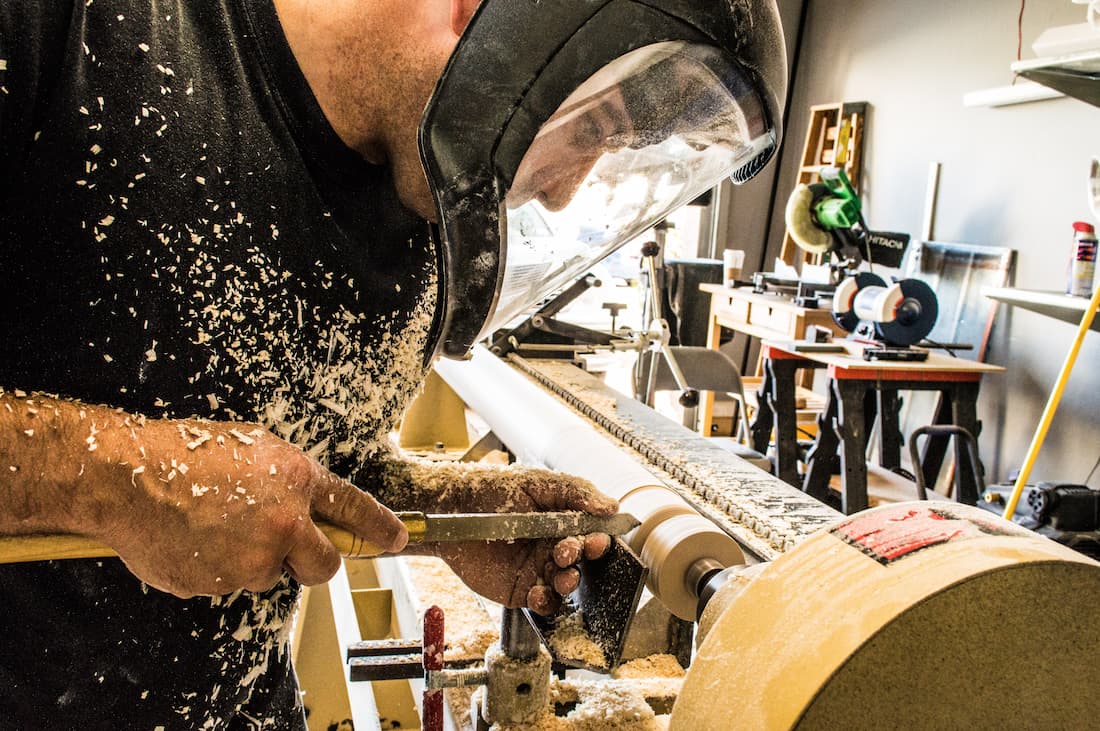Dust can be a woodworker’s worst enemy. It clogs up the wood surface, dulls the finish, and makes an already messy job even more difficult to clean up. So if you are serious about woodworking then it is essential that you have a dust collector in your workshop. In this article, we will talk about what they are, why you need one, how to choose the right one for your needs and other benefits of having one in your shop. We’ll also go over different types of woodworking dust collectors with their pros/cons so that you can find the perfect fit for your needs!
1. What is a woodworking dust collector?
A woodworking dust collector is a machine that collects wood shavings, dust particles, and other debris produced when working with wood to avoid getting in the way or making a mess! Woodworkers use these machines to keep their work-spaces clean by pushing air through filters that capture all of this material so it doesn’t get in your face or make things messy. The following sections will go over what they are, why you need one, how to choose the right one for your needs and other benefits of having one in your shop. We’ll also cover different types of woodworking dust collectors with their pros/cons so that you can find the perfect fit for your needs.
2. Why you need one?
There are many woodworking projects that can leave behind so much dust and debris, you could write your name in it. A woodworking dust collector will help keep the area clean of wood shavings, sawdust, dirt particles and other foreign objects to make sure they don’t get all over your clothes or project. This is especially important when working with finishes like polyurethane or lacquer since even small amounts on unprotected surfaces might cause problems down the road! It’s also great for making sure everything stays safe while you’re not around by minimizing the likelihood of fires starting from stray sparks.
3. How to choose the right dust collector for your needs
One of the most important things to keep in mind when choosing a woodworking dust collector is your budget. Like with most woodshop tools, you get what you pay for so it’s best to invest in quality that will last long enough to recoup its initial cost before having any issues or requiring repairs/replacement! You also need to decide on how much storage space you have available since some are larger than others and may not be able to fit into standard workbenches if they’re too high or wide (or can’t be put under benches at all). Also consider whether there are certain features like filters, blowers etc. which make them more convenient & efficient while working with wood-shop machinery?
Last but not least, you should pay attention to how noisy the dust collector is: because it is better to choose a quiet dust collector.
4. The benefits of having a good dust collector in your workshop
A woodworking dust collector is essential for woodworkers because it can make your life much easier. Some of these benefits include:
– No more worrying about where to put all the shavings, particles and sawdust when you’re working with wood! If you don’t have a dust collector in your shop then chances are that everything will get swept up into loose piles somewhere which could lead to accidents or fires if left unattended.
– Cleaner work spaces where people can walk around without getting dirt everywhere (and not just on the floor)! This allows woodworkers to bring their projects out into the open rather than having them stashed under blankets & tarps while they dry/finish so that others can see what’s going on at all times.
– Better woodworking workshops overall! By having everything properly contained, woodworkers can work more efficiently with less down time getting in the way of their wood projects whether it’s for clients or personal use/enjoyment. Everything is clean, orderly & organized which makes woodcrafting a breeze by reducing frustration levels to almost zero!
– Be able to do what you need without worrying about anything getting dirty or messed up from dust particles on your clothes etc. Things are much easier when they’re kept nice and tidy so others can walk around without worrying about messing things up either accidentally or otherwise (if there are children playing nearby who might not know any better).
– Easier cleanup after woodworking tasks have been completed since wood shavings, wood chips etc. don’t get all over the floor (and potentially into places they shouldn’t be like carpets or rugs).
– The best woodworking dust collectors will also help woodworkers save time & money by reducing downtime between projects with less mess to worry about in general!
5. Different types of woodworking dust collectors and their pros/cons
There are a few woodworking dust collectors that you can choose from as well as specific features which make them unique. Here’s a quick rundown of some of the most common types:
– Air filtration systems help to eliminate wood particles and other harmful materials by pushing air through an area with high pressure so they become trapped in filters rather than getting released into the atmosphere where they could cause problems for woodworkers & others nearby or beyond . While these offer great benefits, there is also a downside since it will take more time to clean out filters between tasks plus moving around machines may require longer hoses/wiring which takes up valuable space. They’re not always easy to install either depending on shop layout but might be worth looking into if woodworking is a serious business.
– Bag or canister filters are great for woodworkers who want something quick & easy to use that doesn’t take up much space since they’re self contained and usually have very few moving parts which means less time spent on maintenance. The downside of this system however, is that you will need to clean out the entire dust bag/canister whenever it gets too full (which could be several times per day depending on how often woodworking tasks get done). This might not be an issue for some but others may consider this as more hassle than it’s worth so keep in mind there are both pros & cons with each type of woodshop dust collector!
There are also other types like wet scrubbers, water separators & more but the most common woodworking dust collectors are air filtration systems & bag/canister filters which is what we’ll be focusing on from here.
– Centralized Woodworking Dust Collector – This type of woodshop dust collector usually hooks up to a central area where all venting flows into with one main filter that’s attached at this point before releasing clean filtered air back out again. Some have multiple smaller inlets though for different tasks so it will depend on your specific needs as well as budget when choosing between these types of woodworking dust collectors .
– Portable Dust Collectors – These units may not look like much since they’re small and compact however there’s a lot going on behind the scenes to make woodworking tasks flow as smooth and easy as possible.
– Shop Vacuums – While these aren’t designed for woodworking dust collection per say, they can be used in conjunction with other types of woodshop dust collector units so it’s worth looking into if you’re on a budget or don’t have enough room/space right now however note that the whole point is having more than one unit since there are advantages & disadvantages associated with each type which will depend on your specific needs (and personal preferences).





